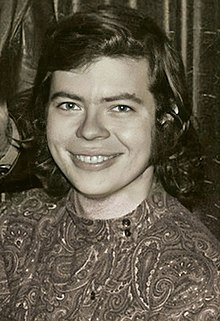Alan Wilson (musician)
| Alan Wilson | |
|---|---|
 |
|
| Background information | |
| Birth name | Alan Christie Wilson |
| Also known as | Blind Owl |
| Born |
July 4, 1943 Arlington, Massachusetts, U.S. |
| Died | September 3, 1970 (aged 27) Topanga, California, U.S. |
| Genres | |
| Occupation(s) |
|
| Instruments |
|
| Years active | 1960–1970 |
| Labels | Liberty Records |
| Associated acts | |
| Notable instruments | |
Alan Christie Wilson (July 4, 1943 – September 3, 1970) was a co-founder, leader, and primary composer for the American blues band Canned Heat. He played harmonica, guitar, and sang with the group live and on recordings. Wilson was lead singer on Canned Heat's two biggest U.S. hit singles. His death at age 27 prefigured that of some of the other rock artists of the 60s.
Wilson was born and grew up in the Boston suburb of Arlington, Massachusetts. Some of Wilson's first efforts at performing music publicly came during his teen years with a jazz ensemble he formed with other musically oriented friends from school. It was around this same time that Wilson developed a fascination with blues music after a friend played a Muddy Waters record for him. After graduating from Arlington High School, he majored in music at Boston University and played the Cambridge, Massachusetts coffeehouse folk-blues circuit. Wilson developed into a dedicated student of early blues, writing a number of articles for Broadside of Boston newspaper and the folk-revival magazine Little Sandy Review, including a piece on bluesman Robert Pete Williams.
Wilson was considered by many of his musical peers to be an expert on the blues musicians who came before him; many considered him as possessing an exceptional ability for connecting musically with the elder bluesmen. His biggest influences included Skip James, Robert Johnson, Son House, Charley Patton, Tommy Johnson, John Lee Hooker, Muddy Waters, and Bukka White. James, in particular, was a highly exalted figure in Wilson's personal music journey. In high school, Wilson studied James' 1931 recordings with great ardor. Subsequently, Wilson began singing similar to James' high pitch. Wilson eventually perfected the high tenor, for which he would become known.
...
Wikipedia
